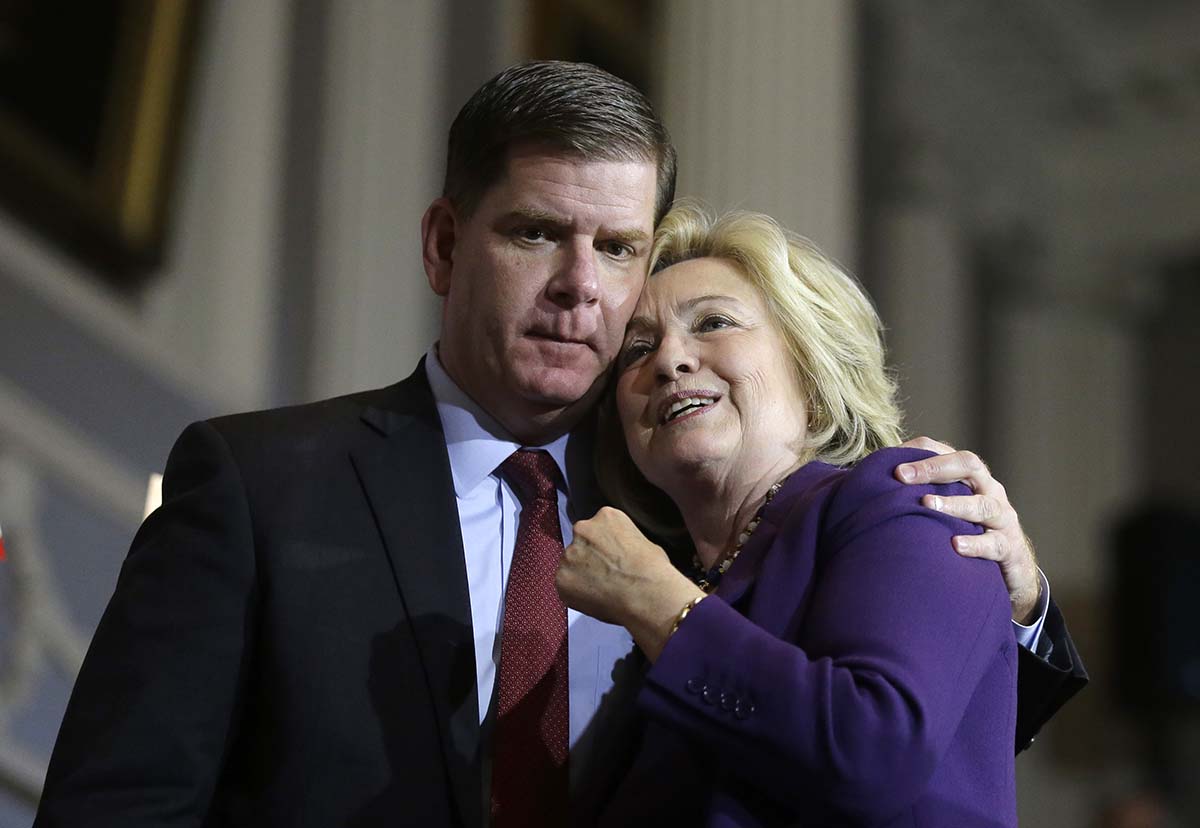Is the Massachusetts Democratic Primary an Afterthought?

Photo via AP
At the end of Thanksgiving Weekend, former Secretary of State and Democratic front-runner Hillary Clinton stood on the Faneuil Hall stage to receive the endorsement of Boston Mayor Marty Walsh.
It was like all political endorsements: over the top and filled with the two politicos fawning over each other.
“Nobody comes closer to her experience. Nobody comes closer to her achievements,” said Walsh, speaking before a crowd of union members and labor activists.
Clinton returned Walsh’s favorable comments, calling the mayor a man who understands immigrants and the troubles facing middle class workers in the United States.
“Here’s what’s really important about this mayor. Marty Walsh gets it. He knows what it’s like to get knocked down, but he refused to be knocked out,” said Clinton.
They posed for photos, chanted, and then Clinton unveiled a $275 billion infrastructure plan that will probably never see the light of day in a Republican-controlled Congress.
But does any of this matter in the Massachusetts Democratic primary? Probably not, as this event was as much about Clinton pushing her infrastructure plan as it was about shoring up Walsh and his rock solid labor credentials as a surrogate to deploy on the campaign trail.
In 2008, Clinton carried Massachusetts by 15 points but ended up losing Boston by nine points to then-Senator Barack Obama after receiving the backing of late Mayor Tom Menino.
There is a smattering of support from elected officials for former Maryland Governor Martin O’Malley, and a handful of union locals are breaking with their national organizations and throwing their weight behind Vermont Senator Bernie Sanders, but it’s all peanuts compared to what Clinton has cobbled together.
This time, Clinton appears to be on course for an even bigger win than the one she scored in 2008. She’s received the support of most of the state’s Democratic establishment, including Walsh, former Governor Mike Dukakis, Attorney General Maura Healey, Senate President Stan Rosenberg, and Treasurer Deborah Goldberg. All of the members of the state’s congressional delegation are behind her candidacy except for Senator Elizabeth Warren (heh, well…) and Congressman Mike Capuano. Numerous state activists and high-level operatives are backing Clinton, including Charles A. Baker III and Lynda Tocci of the Dewey Square Group. Additionally, the limited polling of the Massachusetts Democratic primary has repeatedly shown Clinton with a commanding double-digit lead over Sanders and O’Malley.
With Massachusetts all but officially locked up for Clinton, it’s unlikely that any of the Democratic bigwigs in Massachusetts will really have to put their political operations to the test on March 1. Clinton’s success at shoring up all this support in Massachusetts so early is more about tapping into the deep bench just to the south of New Hampshire and mobilizing it for the all important First In The Nation primary. As Adam Reilly writes, this endorsement event was just as much an event for Walsh as it was for Clinton:
To make Sanders go away, Clinton needs not just to win New Hampshire, but to win big. (Given the media’s penchant for drama, and history with Hillary, a close win will almost certainly be spun as a de facto loss.) If Walsh can play a substantive, visible role in Clinton’s Hampshire campaign — touting her blue-collar bona fides on the campaign trail, say, while guiding the effective deployment of local union activists behind the scenes — he’ll get plenty of credit for a successful outcome. In fact, given the Boston media’s eagerness for Massachusetts storylines in the 2016 presidential race, he might even get more credit locally than he actually deserves.
It’s all about New Hampshire and Iowa, as Walsh told WGBH’s Reilly.
Not since 2000 has there been such little focus on Massachusetts and its role in the presidential campaign. It’s a weird feeling for a state so accustomed to hitting well above its weight in national politics.

